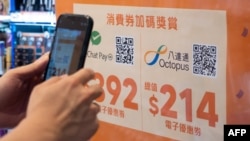
This article was originally published on VOA News - Economy. You can read the original article HERE
U.S. Treasury Secretary Janet Yellen has joined several independent economists to express her frustration about low consumer spending and the property crisis in China. Some experts have expressed disappointment over Beijing's limited measures to stimulate consumer spending, which is one of the biggest hurdles in the Chinese economy.
"Our view has been that raising consumer spending in China as a share of GDP (gross domestic product) is really important, along with measures to address problems in the property sector," Yellen said recently. "So far, I would say, I haven't really heard any policies on the Chinese side that address that."
Yellen has criticized China for its focus on subsidizing large state-owned companies instead of working to revive the wider economy, the world's second largest. Analysts have suggested that China should stop subsidizing manufacturing companies with the money of households.
The World Bank has predicted that China's GDP growth will be 4.8% this year, short of the country's 5% goal. It will slip further to 4.3% in 2025, the bank predicted.
Low consumer demand in China can bring down the rate of growth in the global economy and affect the prospects of businesses in the U.S. and other parts of the world.
"For U.S. companies like Apple, Nike, Microsoft, KFC, Starbucks, Coca-Cola, Tesla or General Motors, to name a few, China is a big market. Any increase or decrease in consumption in China can influence their bottom line," Lourdes Casanova, director at Cornell University's Emerging Markets Institute, told VOA.
There are serious fears about the U.S. and the European Union slipping into recession, said Francesco Sisci, an expert on China affairs and director of Appia Institute, an Italy-based think tank.
"In China, there's deflation and no sign of getting out of it. If China doesn't get out of deflation, it could multiply recessionary forces worldwide. It might actually happen," Sisci said.
Tendency to save, not spend
China has taken several measures to revive the economy in recent weeks. They include lowering mortgage rates and cutting the reserve requirement ratios (RRR) to encourage banks to lend more money. The idea is to support households repaying home loans and encourage people to purchase more houses from the crisis-hit property business.
However, analysts are not convinced about the effectiveness of the move. "Housing demand is unlikely to see any meaningful revival just because of lower mortgage rates and down payment requirements, as experience shows," the Peterson Institute for International Economics (PIIE) said in a commentary.
Casanova thinks low consumer demand is not an easy problem to resolve because the average Chinese believes in savings more than spending. Personal consumption expenditures (PCE) as a percentage of GDP stands at 68% in the United States, 53% in Europe and 39% in China. Americans represent 31% of global PCE, while China's people represent just 11%.
"There is room for improvement in China but, you can't change consumers' habits overnight and, clearly, Chinese consumers are much thriftier than the American ones," she said. Americans often keep their cars outside the garage because garages are full of household items, clothes, toys, garage tools and other things, she pointed out.
One way to increase consumer demand is to increase salaries and take additional social security measures. But for companies that would increase production costs and hurt exports, Sisci said.
"What China needs is transformative reforms that would have a political price, and the ruling Communist Party is not eager to pay it," he said.
Contradicting the World Bank's view, China's Vice Minister of Finance Liao Min said the economy was responding positively to a series of stimulus measures taken by the government.
"These initiatives aim to leverage government spending to stimulate overall social investment and consumption, thereby increasing effective market demand," Liao said.
This article was originally published by VOA News - Economy. We only curate news from sources that align with the core values of our intended conservative audience. If you like the news you read here we encourage you to utilize the original sources for even more great news and opinions you can trust!











Comments